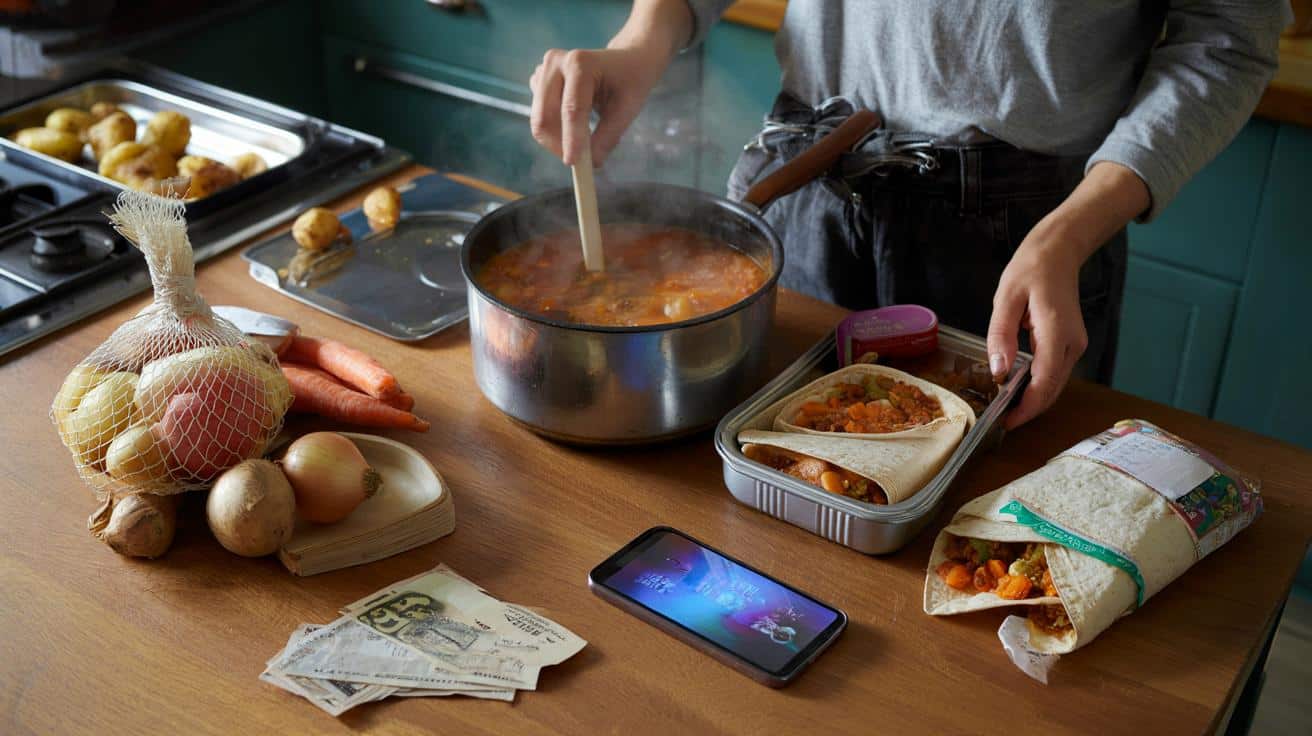Families are staring down the most expensive month of the year with the same half-jammed drawer of loyalty cards and “we’ll sort it next week” receipts. Here’s a surprisingly human fix: a tiny ritual that costs a fiver, takes half an hour, and quietly reshapes the week. No spreadsheets. No lectures. Just a £5 Sunday habit that turns the tide before Christmas lands with both feet.
The last of the roast potatoes are cooling on a tray. A football shirt is drying on the radiator. There’s a single £5 note under the fruit bowl, tucked beside a bus ticket and a crumpled raffle stub. One parent is scrolling the takeaway app; the other is tallying the week’s spend on the back of an envelope. It felt almost silly to start with just £5. Then the habit stuck, and the panic eased. Christmas doesn’t wait for your bank balance. Christmas doesn’t wait for your bank balance. It starts with a fiver.
The £5 Sunday reset: why it works
The idea is gloriously simple: use £5 on Sunday to buy a few humble staples that turn leftovers into a ready-to-go base for the week. Think onions, carrots, a tin of tomatoes, a tin of chickpeas, maybe wraps or pasta. With that base, you batch one pot, portion two lunches, and line up a “no-panic dinner” for the midweek wobble.
In Leeds, Amira and Joe tried it after a bruising shop in September. Their £5 went on two tins, an onion bag, and a pack of tortillas; Sunday’s chicken became Monday’s chilli and Tuesday’s burritos, and the takeaway stayed un-ordered. We’ve all had that moment when the fridge feels empty but it isn’t — the £5 simply unlocks what’s already there.
This small constraint does the heavy lifting. Behavioural science calls it an anchor: a cue that starts a sequence you follow without willpower gymnastics. The money is tiny, so there’s no pressure, yet the outcome is big because it prevents the £30 “I can’t face it” meal and the £4-a-head lunch dash. Friction goes down. Savings go up.
Do it this Sunday: the simple £5 playbook
Put a 30-minute timer on your phone and lay out what you’ve got: leftover roast, veg, odds and ends. Spend £5 on gap-fillers — onions, carrots, tomatoes, chickpeas, wraps — and make a one-pot base that becomes two dinners and two lunches. Start the clock for 30 minutes and treat it like a game. Write down three fast dinners you can assemble in under 15 minutes from that base.
Common slip-ups? Buying “project” ingredients you’ll use once, or batch-cooking eight meals you end up bored of by Thursday. Go for versatile, not fancy, and portion in twos so the freezer doesn’t become a museum. Let’s be honest: nobody actually does that every day. Better one pot that gets eaten than five that grow frost.
Think of this like a weekly pit stop: a tiny refuel that keeps the wheels on.
“The £5 isn’t the saving — it’s the starter pistol,” says Lauren, a money coach and mum of two. “It stops the 6pm spiral, which is where the money leaks out.”
- Buy three base items with your £5 that stretch meals.
- Batch one pot; portion two lunches immediately.
- Set a “no takeaway” rule for one night and choose the swap.
- Do a 10-minute subscription sweep: cancel or pause one thing.
- Pick one item to sell or list before bed.
From now to Christmas: compounding gains
Here’s how the math stacks without feeling like math. One avoided takeaway or delivery saves £20–£35 in a single evening. Two packed lunches for adults can dodge £8–£12 of meal deals. Using the £5 base to sweep leftovers keeps £10–£20 of food from the bin. A quick Sunday “subscriptions blitz” often frees £5–£15 a week by pausing apps no one uses. Add a modest sell-one-thing rhythm — toys, outgrown coats, gadgets — and you’ll see £150–£300 clear before the tree lights are untangled. Across seven to nine weeks, families regularly nudge past £1,000 in avoided spend and small wins. Small, boring moves beat big, heroic ones. The trick is the ritual, not the heroics.
| Point clé | Détail | Intérêt pour le lecteur |
|---|---|---|
| The £5 Sunday shop | Buy staples that turn leftovers into a base pot, two lunches, and a 15-minute midweek dinner. | Transforms a fiver into £40–£60 of avoided takeaways and meal deals. |
| 30-minute money sweep | Cancel one small subscription, skim loyalty points, and set one “no-spend swap” for the week. | Immediate wins without spreadsheets; momentum you can feel. |
| Family buy-in | Kids choose one dinner; five-minute toy sort to sell or donate; one rule everyone repeats. | Makes the habit stick and turns saving into a team sport. |
FAQ :
- How can £5 make a dent when food is so expensive?It’s not the £5 alone — it’s the chain reaction it starts. Those staples turn leftovers into a base, which kills the panic buy and the £30 delivery that follows. The fiver primes the wins.
- Is £1,000 by Christmas realistic if it’s already November?For many families, yes, when wins stack: one fewer takeaway each week, two packed lunches, one paused subscription, plus a couple of small sales. That can hit £120–£160 a week and a few hundred from selling, which gets you close fast.
- What should I actually buy with the £5?Pick flexible, cheap heroes: onions, carrots, tinned tomatoes, chickpeas or beans, tortillas or pasta. They pair with almost any leftover meat or veg and turn into soups, stews, wraps, or bakes.
- How do I keep kids on board?Give one clear job and a choice: they pick Wednesday’s dinner from two options and help portion lunches. A five-minute toy sort to sell or donate keeps them involved without drama.
- Does this replace a proper budget?No — it sits alongside it. The £5 Sunday habit is a behaviour fix for the messiest moments of the week, where budgets usually break. Think of it as the routine that makes your budget believable.









